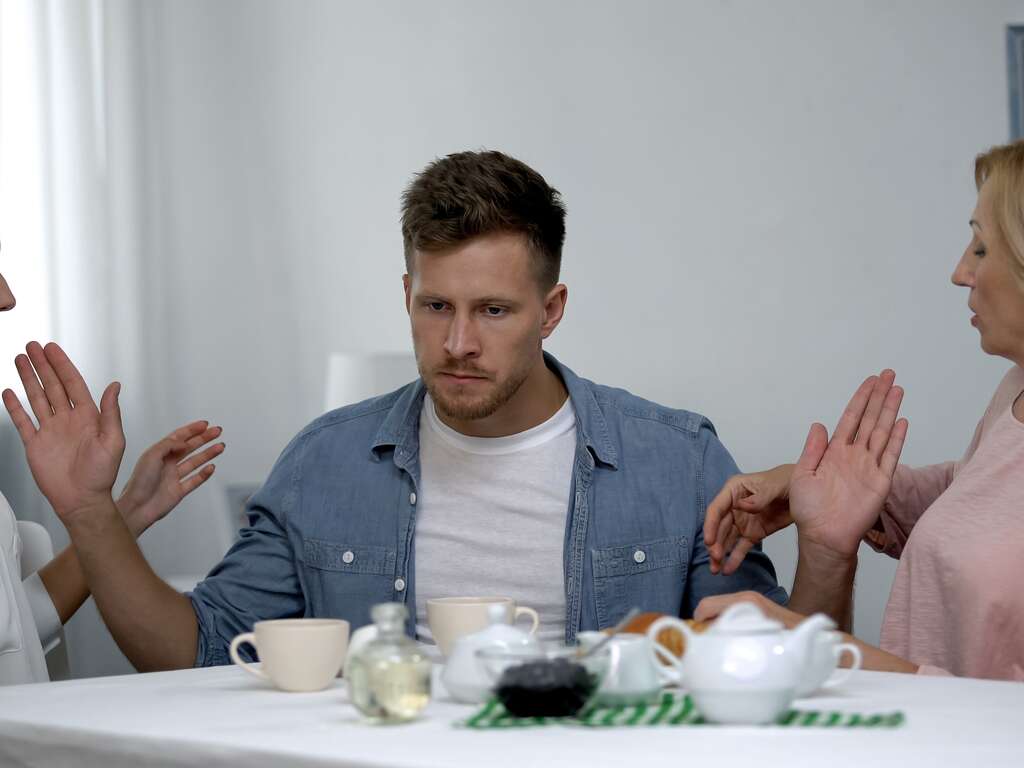An intervention is a pre-planned meeting between concerned individuals, often family members or close friends, and a loved one or friend struggling with addiction. The goal of an intervention is to motivate the loved one to seek help in overcoming addictive behavior.
This article will go over what is an intervention and additional aspects around getting someone help with alcoholism and drug dependence.
Professional Intervention
A successful intervention requires careful planning by friends and family, often with the help of an intervention specialist, to help the individual understand how their addiction is harming their own life and affecting others, to recognize that help is available and to agree to accept help.
Interventions are appropriate for any addictive behavior, including alcohol or substance use disorders, eating disorders and compulsive gambling, to name a few. People struggling with a loved one’s addiction may want to consider an intervention once other options for encouraging the affected person to accept treatment have failed.
How Does an Intervention Work?
The intervention process requires an understanding that addiction is a chronic disease. Because of this, the individual struggling with addiction deserves compassion and understanding, not an angry attack. The point of an intervention is not to gang up on the individual in need of help, but rather to have a concrete plan in place for getting them the help they need.
The idea is to encourage positive change in the individual and help them get to a place where they are willing to accept treatment and professional help, without using coercive means. Many people who are addicted to a drug or alcohol are instinctively resistant to being told what to do, and are frightened of leaving behind their drug dependence and addictive behaviors.
How Does Alcoholism and Drug Dependence Develop?
Substance Use Disorders Can Arise Because of Trauma
The National Council on Behavioral Health has noted a marked increase in addiction among people of all sorts. Many people fall into drug addiction and alcohol addiction because they are seeking an escape from problems in their lives, both external and internal. Their substance abuse is a coping mechanism that enables them to go on with life despite the negative effects of their use. People in this situation engage in drug and alcohol abuse because they have traumatic events in their past or intolerable conditions in their daily life. Their alcohol and drug use is difficult to let go because they cannot imagine coping with life without drugs or alcohol. Interventions work by enabling the person to seek help for these underlying issues and by demonstrating the support that they have from their families and loved ones, which they may not recognize in the depths of their addiction.
Not All Addicts Look The Same
Other people have relatively stable lives aside from their substance abuse and may have no significant trauma in their history. Their substance abuse problem develops because they start using drugs that have an overwhelming addictive effect, initially for recreational purposes, and become dependent. They may still be able to manage holding a job, having relationships, and accomplishing daily living with gusto and may feel that their drug use is entirely voluntary.
“Functioning” addicts
The illusion of success that some addicts are able to maintain makes it difficult for the addicted person to stop using, even if their life is otherwise filled with support and stability. They may feel that they are “functioning” in spite of their addictive behaviors. In cases like this, an intervention is needed to show the addicted person that their addiction affects their friends and family. An effective intervention works by encouraging them to accept treatment to end the pain their addiction is inflicting on their loved ones, and revealing the ways that their “functional” lifestyle is actually hurting others.
Co-Occurring Disorders With Substance Abuse
Some people with a substance use disorder are also struggling with mental illness. Their alcoholism and drug dependence develops because they are self-medicating in order to manage their symptoms, or because their mental health issues blind them to the effects of their substance abuse.
People with co-occurring mental health issues may be resistant to treatment because they do not believe they will be able to deal with their mental illness without engaging in substance use. A drug addict with a co-occurring mental health issue requires the help of addiction professionals as well as mental health professionals, and an effective intervention may incorporate both disciplines to boost the chances of the intervention’s success in encouraging an individual to seek treatment.
Who should attend the intervention?
People the individual cares about and respects should attend an intervention. This might include family, friends, co-workers or clergy members. Loved ones who have been exposed to the destructive behaviors of the addicted person are especially helpful in an intervention, as they can elaborate on how their loved one’s addiction has affected them personally, in hopes of encouraging the person to start the recovery process.
Family Members
Often the loved ones included in the intervention will be family members who have been subject to the effects of the addiction. Families are systems, wherein every issue in the family inevitably has its effects on other people. When families use an intervention to encourage their loved one who is suffering from a substance use disorder to seek treatment, they are doing so not only for the well-being of their loved one, but for their own.
Gathering an entire family for an intervention to confront one of their own about their behavior may be difficult, but this can exert a strong effect on the loved one they are encouraging to enter recovery. A systemic family intervention is a specific type of intervention that works by highlighting the ways that an individual’s abuse of drugs or alcohol has affected the people they are related to. Still, it is not always wise to invite the entire extended family to an intervention.
The families’ boundaries may play a role in deciding who to invite, as people who are outside of the direct scope of the effects of the drug or alcohol abuse may be extraneous to the healing process of the intervention. Interventions work when the person who is the subject of the intervention can look around the room and identify how their use has affected every member of their family who is present.
Having all the family members who are present on the same page is especially important, as an intervention team can be sabotaged by the inclusion of someone who is less invested in encouraging the subject to seek support. If someone is present who does not believe the drug or alcohol addicted family member needs treatment, they can potentially become an accomplice for the addict, who is likely to seize on any opportunity to argue against entering recovery. An effective group intervention starts with a shared understanding of the goals and the stakes of the effort.
Friends
Some people’s addictions are relatively invisible to their families, especially if they live a significant distance away and are able to maintain an illusion of stability and adequate functioning in their communication with family members. Others may have become distant from their biological family, whether because of their addiction or because of other issues within the family. But friends may recognize the need for addiction treatment and work to encourage their friend to make a positive change, with or without the assistance of their family.
A group of friends who recognizes that their loved one needs support to overcome an issue with drug or alcohol addiction can still convene a successful intervention to encourage their loved one to seek treatment. They may want to reach out to their family to ask if they want to be included, or they may prefer to keep the matter from the family for their loved one’s privacy, especially if they are estranged from their family.
Size of the Intervention Team
For some interventions, it is best to have a large group of family and friends, while for others, a smaller cohort of people who support the person may be advisable. Including people from outside the family or affected group of friends is typically not advisable, as they will have no direct experience with the substance use and will not be able to reflect on how they have been affected by the alcohol or drug use of the person in question. Conversely, an intervention with a single person is not advisable, as the loved one in question may be easily overwhelmed by the addict’s refusal to seek treatment. Interventions require a concerted effort by multiple people to convince their loved one of the necessity of seeking help.
Is A Professional Intervention Necessary?
While an intervention can be assembled informally and include only people from the person’s life, many addicts require a professional intervention, aided by an intervention team that includes a drug counselor or a professional interventionist and other licensed professionals. A licensed alcohol and drug abuse counselor may be a necessary addition to an intervention team if the person in question has been using for many years, or if they have been through a previous intervention without success in urging them to take the first step toward recovery.
Before the Intervention
Talk to a doctor, addiction recovery professional, psychologist, or intervention specialist, called an interventionist, to determine the best approach for your particular situation and how to put a treatment plan into place. In most cases, having an interventionist in the room during the intervention will lead to better outcomes.
Addiction recovery professionals can also direct you to the educational materials you need to better understand the disease of addiction, as well as resource materials to give your loved one. They can also keep the intervention on track if the loved one begins lashing out or engaging in denial to avoid getting help for their addiction, which is a common occurrence in interventions.
The Rehearsal Stage
In cases where interventions are arranged with professional help, there may be a rehearsal before the actual intervention. The loved ones who are included in the intervention, both friends and family, will have a chance to practice their “pitch” to their loved one to encourage them to seek treatment for their substance issues. This is a structured opportunity to address any issues that may arise during the actual intervention.
A rehearsal of the intervention is also an opportunity to iron out details of the treatment plan. Professional counselors can be a huge help at this stage, as they can help people come to terms with the uncomfortable prospect of confronting their loved one about their substance use and addiction. Families are often subject to their own internal issues, and interventions that include professional family therapists and substance use counselors are a great way to help these loved ones prepare for the intervention and overcome any internal obstacles to a successful intervention.
In the rehearsal stage of the intervention, pre-plan what each person will say. Each person who has been harmed by the individual’s addictive behavior should write down specific examples. These could be in the form of a letter or simply notes to keep the speaker on track. An effective intervention includes explicit statements about the effects of the drug addiction or alcoholism on each individual present, whether they are a family member or a friend.
Identifying Options For Addiction Treatment
The intervention team may work to identify a treatment center that they would encourage the person to attend. The National Council on Behavioral Health has lists of treatment options that you can prepare to extend to the person who requires treatment for their addiction.
Having a list of treatment centers ready to present to the person during the formal intervention is a good way to use the momentum of the intervention to move the person toward taking responsibility for their own recovery. Many treatment programs also require a referral from a licensed alcohol or drug addiction professional, so a professional intervention is a good way of ensuring access to treatment options and treatment programs that may not be available otherwise.
Have local 12-step or other support group meeting schedules on hand for the intervention, as well as information on the specific treatment program you have researched. If the intervention is successful and your loved one agrees to treatment, you will need to act quickly. Interventions work best when all of the details are worked out before hand; otherwise you risk the possibility of your loved one being overcome by their addiction once again and leaving the mindset necessary for getting help for their addiction.
What to Do If The Intervention Is Not Successful
Decide how to proceed if the intervention is not successful. Ask your therapist, interventionist or drug addiction specialist for guidance on the next steps. Decide how you and others can avoid enabling the addictive behavior and commit to making necessary changes after the intervention. Addiction is not the same for everyone, and some people require multiple interventions before they realize that they need help to recover.
Even if your loved one isn’t ready for help, it’s important for those close to the individual to get help for themselves through counseling and support group participation. Interventions often enable other people involved to recognize other addictive behaviors that they may be engaging in and
During the Intervention
The intervention should take place in a neutral location, and at a time when the individual is not under the influence of drugs or alcohol.
Your loved one should not know about the intervention ahead of time. Once everyone is assembled, everyone involved will take turns expressing how the addictive behavior has impacted them. It is common for the individual to become angry and defensive, but staying as calm as possible is reassuring and supportive.
After everyone has spoken, treatment options are presented. If they agree, set your plan into immediate motion. If they don’t agree, go to the course of action you decided on in your pre-planning stage. You may decide that if your loved one does not agree to get help for their addiction, you and your family will cease contact or stop giving them financial support.
Again, most interventions are more successful with the guidance and support of a professional interventionist present in the room. An intervention without an addiction professional can quickly degrade into a negative and unsuccessful confrontation that can drive your loved one deeper into their addiction.
After the Intervention
While your loved one is in treatment, your continued support is critical. Continue to express your belief in their ability to be successful and reach sobriety. Participate in any family counseling offered by the treatment center, as well as your own therapy and recovery support.
If your loved one has refused treatment, don’t give up. The intervention process has helped open the door and has given your loved one food for thought. Plan a time to try again. You may need to stick to the plan that you made, which could include reducing contact with your loved one or cutting them off from financial support. If so, seek support from the people around you to maintain your commitment to getting help for your loved one’s addiction.
Turning Point of Tampa has been offering Licensed Detox and Residential Treatment for Addiction, Eating Disorders and Dual Diagnosis in Tampa since 1987. If you need help or know someone who does, please contact our admissions department.









